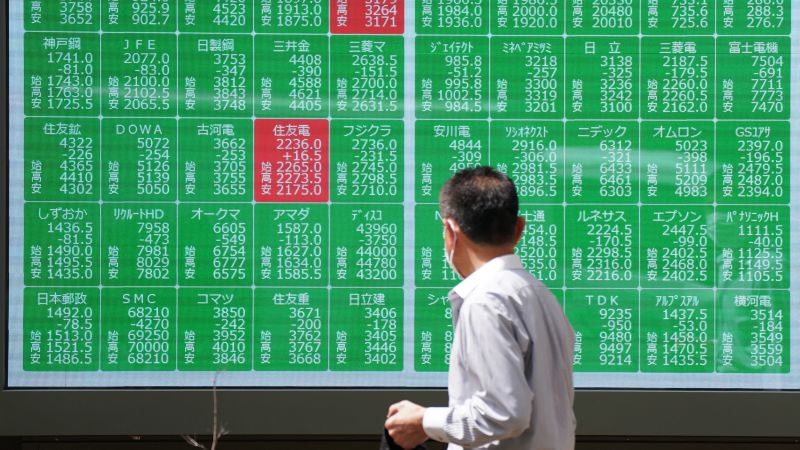On Friday, Japanese stocks saw a significant drop as global markets reacted to concerns about the US economy and anticipated further interest rate hikes by the Bank of Japan. The Nikkei 225 index fell 5.8%, marking its biggest daily decline since March 2020. This decline followed a global stock rout triggered by weak US economic data. The benchmark Stoxx Europe 600 index and European markets also opened lower on Friday, with Germany’s DAX and France’s CAC 40 both down. London’s FTSE 100 was also lower, and US futures indicated another weak opening for Wall Street.
Earlier in the week, the Bank of Japan raised interest rates by 15 basis points to 0.25% and announced plans to taper its bond buying, signaling more rate hikes to come in the future to combat inflation. This move by the central bank aimed to close the gap in interest rates between the US and Japan, causing the Japanese yen to appreciate against the dollar. On Friday, the yen weakened further against the dollar, posing a risk to Japanese equities. The strengthening yen threatens the profits of Japanese exporters and could impact the decade-long bull market of Japanese equities.
Despite strong corporate earnings and governance reforms, the weakening yen over the past four years has supported the Nikkei 225’s surge to all-time highs this year. However, as the yen strengthened in the past three weeks, Japanese equities have corrected, with the Nikkei down 12% since mid-July. Analysts remain positive about Japanese stocks in the long term, as inflation gains traction and a positive wage-price spiral strengthens the economy. Rising wages and prices could help Japan overcome years of economic weakness and boost the stock market.
In other parts of Asia, markets also experienced declines on Friday, with South Korea’s Kospi, Australia’s S&P/ASX 200, Hong Kong’s Hang Seng Index, and China’s Shanghai Composite all posting losses. On Wall Street, the Dow Industrial Average, S&P 500, and Nasdaq Composite all ended lower, reflecting concerns about the weakening US economy. New economic data showed an increase in first-time jobless claim applications and continuing claims, indicating a slowdown in the economy. Analysts expect the Federal Reserve to cut interest rates three times this year, as the central bank signaled a rate cut in September during its policy meeting.
Overall, the global market turmoil, fueled by concerns about the US economy and interest rate hikes by central banks, has led to significant stock market declines in Japan and other Asian countries. The impact of a strong yen on Japanese equities, combined with economic weakness in the US and elsewhere, has fueled uncertainty and fear among investors. In this volatile environment, market participants are closely watching central bank policies and economic indicators to anticipate future moves and navigate the challenges ahead.


